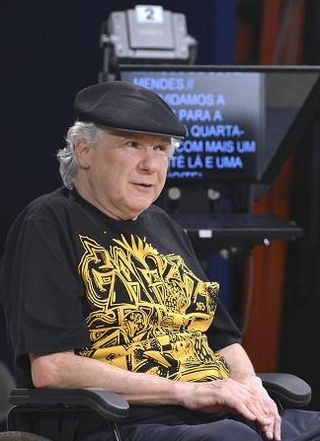Related Research Articles

The Ministry of Foreign Affairs is responsible for managing the foreign relations of Brazil. Brazil is a significant political and economic power in Latin America and a key player on the world stage. Brazil's foreign policy reflects its role as a regional power and a potential world power and is designed to help protect the country's national interests, national security, ideological goals, and economic prosperity.

Brazilian Integralism was a political movement in Brazil, created in October 1932. Founded and led by Plínio Salgado, a literary figure who was somewhat famous for his participation in the 1922 Modern Art Week. The movement had adopted some characteristics of European mass movements of those times, specifically of Italian fascism, but distancing itself from Nazism because Salgado himself did not support racism. He believed that every person of every race should unite under the Integralist flag. Despite the movement's slogan "Union of all races and all peoples", members and leaders like Gustavo Barroso held anti-Semitic views. The name of the party created to support its doctrine was Brazilian Integralist Action. The reference to Integralism mirrored a traditionalist movement in Portugal, the Lusitanian Integralism. For its symbol, the AIB used a flag with a white disk on a royal blue background, with an uppercase sigma (Σ) in its center.

The military dictatorship in Brazil, occasionally referred to as the Fifth Brazilian Republic, was a governmental structure established on 1 April 1964, after a coup d'état by the Brazilian Armed Forces, with support from the United States government, against President João Goulart. The Brazilian dictatorship lasted for 21 years, until 15 March 1985. The coup was planned and executed by the most senior commanders of the Brazilian Army and received the support of almost all high-ranking members of the military, along with conservative elements in society, like the Catholic Church and anti-communist civil movements among the Brazilian middle and upper classes. The military regime, particularly after the Institutional Act Number Five in 1968, practiced extensive censorship and committed gross human rights abuses, including institutionalized torture and extrajudicial killings and forced disappearances. Despite initial pledges to the contrary, the military regime enacted in 1967 a new, restrictive Constitution, and stifled freedom of speech and political opposition. The regime adopted nationalism, economic development, and anti-communism as its guidelines.

Regina Blois Duarte is a Brazilian actress who briefly served as Special Secretary of Culture, a cabinet position in President Jair Bolsonaro's federal administration, from March to May 2020.

The 1964 Brazilian coup d'état was the overthrow of the Brazilian president João Goulart by a military coup from March 31 to April 1, 1964, ending the Fourth Brazilian Republic (1946–1964) and initiating the Brazilian military dictatorship (1964–1985). The coup took the form of a military rebellion, the declaration of vacancy in the presidency by the National Congress on April 2, the formation of a military junta and the exile of the president on April 4. In his place, Ranieri Mazzilli, the president of the Chamber of Deputies, took over until the election by Congress of general Humberto de Alencar Castelo Branco, one of the main leaders of the coup.
Bernardo Sorj is a Brazilian social scientist, retired professor of Sociology at the Federal University of Rio de Janeiro. He is Director of The Edelstein Center for Social Research and of the Plataforma Democrática Project. He has published 30 books and more than 100 articles, on Latin American political development, international relations, the social impact of new technologies, social theory and Judaism.

Corruption in Brazil exists on all levels of society from the top echelons of political power to the smallest municipalities. Operation Car Wash showed central government members using the prerogatives of their public office for rent-seeking activities, ranging from political support to siphoning funds from state-owned corporation for personal gain. Mensalão for example was the practice of transferring taxpayer funds as monthly allowances to members of congress from other political parties in consideration for their support and votes in congress. Politicians used the state-owned and state-run oil company Petrobras to raise hundreds of millions of reais for political campaigns and personal enrichment.

Silvio Tendler is a Brazilian filmmaker. With more than 40 films released by 2014, including feature and short films, Tendler is one of the most respected Brazilian documentarist. Due to his focus on people like Juscelino Kubitschek, João Goulart, and Carlos Marighella, he is known as "the filmmaker of the defeated" or "the filmmaker of interrupted dreams".

Inês Etienne Romeu was a Brazilian political prisoner held in extrajudicial detention in a Brazilian torture camp in the early 1970s. Romeu has been described as the sole captive to survive the camp. In 2014, Colonel Paulo Malhães testimony to the National Truth Commission revealed that Colonel of the Army Cyro Guedes Etchegoyen was the person in charge of the House of Death. He was head of the Army Information Center (CIE) from 1971 to 1974. He was also in charge of a group Brazilian military sent to train Augusto Pinochet's military personnel. Colonel Etchegoyen was trained at US Army School of the Americas. Paulo Malhães, would later claim that the purpose of the center was to convince suspected political opponents to serve as double agents against regime opponents. The main technique used to turn suspects into double agents was torture, which would be backed up by blackmail and clandestine payments.
Terrorism in Argentina has occurred since at least the 1970s, especially during the Argentinian Dirty War, where a number of terror acts occurred, with support of both the democratic government of Juan Perón, Isabel Perón and the following de facto government of the National Reorganization Process. In the 1990s, two major terrorist attacks occurred in Buenos Aires, which together caused 115 deaths and left at least 555 injured.
Therezinha de Jesus Zerbini ORB was a Brazilian attorney, feminist leader, and founder of the Women's Movement for Amnesty in Brazil. Zerbini chronicled contemporary Brazilian history, reporting on civilians and politicians who had been imprisoned, tortured, and persecuted by the dictatorship, which was systematically denied by the military authorities.

Antônio Hamilton Martins Mourão is a Brazilian politician and retired military officer who served as the 25th vice president of Brazil from 2019 to 2022.

The Riocentro bombing was an attempted terrorist attack that took place on the evening of 30 April 1981, during a May Day celebration concert at the Riocentro convention center in Rio de Janeiro, Brazil. The bombing, carried out by officers of the Brazilian Army, was a false flag operation intended to frame left-wing guerrillas as violent and thereby halting the country's transition towards democracy. It ended up having the opposite effect, accelerating the end of Brazil's military regime, in power since 1964.
Associação Brasileira de Jornalismo Investigativo is an organization for Brazilian Journalists wanting to exchange information, experiences, and tips about investigative journalism. They are a non-profit association maintained by the journalists themselves. Some of their goals include: holding congresses, seminars, and specialized workshops; taking care of the professional improvement of journalists; publishing books on the subject; and hosting forums for exchanging experiences.

A Verdade Sufocada - A História que a Esquerda não quer que o Brasil conheça (2006) is the second memoir of the retired colonel of the Brazilian Army, Carlos Alberto Brilhante Ustra, the first Brazilian military man convicted of practicing torture during the military dictatorship in Brazil (1964-1985).
Ternuma is a non-governmental organization formed in 1998 by military, ex-military, family members and their sympathizers that aims to interdict and deny the past about the military dictatorship in Brazil from 1964 to 1985.
LHT HIGGS Produções Audiovisuais LTDA, better known by its trade name Brasil Paralelo, is a Brazilian company founded in 2016, in Porto Alegre, that produces historically revisionist and conservatively biased propaganda documentaries about politics, history and current events. The videos are published on YouTube and have been shown since December 9, 2019 on TV Escola, a state television channel linked to the Ministry of Education and, since April 6, 2021, on the Panflix platform of the Jovem Pan group.

The Brazilian Integralist Front is a Brazilian political movement with a fascist inspiration and an anti-liberal, anti-communist, traditionalist and extreme right nationalist character. It appeared in 2004, in the so-called I Integralist Congress for the 21st century, held in the city of São Paulo, but it was officially founded on January 22, 2005.

The Cohen Plan was a document forged by the Brazilian military with the aim of establishing the Estado Novo dictatorship in November 1937. One of the greatest falsifications in Brazilian history and an example of the intersection between antisemitism and anti-communism in the country, it was fraudulently attributed to the Communist International, which, allegedly, would seek to overthrow the government through strikes, the burning of public buildings and popular demonstrations that would end in looting, depredation and the murder of authorities. As part of the farce, it was "discovered" by the Armed Forces, allowing those who opposed the government to be labeled as "communists" and, finally, it was used to legitimize the coup d'état that implemented the Estado Novo.

The Department of Political and Social Order or DOPS was a secret police organ of the Brazilian government, notably used by the Estado Novo of Getúlio Vargas and the military dictatorship established by the coup of 1964. The DOPS was established in 1924. It was responsible for controlling and repressing political movements against the government.
References
- ↑ Gomes, Nardele. "Dia na História: atentados a bomba da Aliança Anticomunista Brasileira em 1976". Archived from the original on 2014-12-21.
- ↑ "BOMBA EXPLODE EM CENTRO DE PESQUISA". Folha de S.Paulo. 5 September 1976. Archived from the original on 19 March 2012. Retrieved 30 March 2021.
- ↑ "ATENTADOS CONTRA A REDEMOCRATIZAÇÃO". memoriaglobo.globo.com. Archived from the original on December 21, 2014. Retrieved November 25, 2017.
- ↑ Amaral, Marina (February 9, 2012). "Conversas com Mr. DOPS". Agência Pública . Retrieved 6 December 2018.
A intenção era "profissionalizar" a polícia brasileira – sobretudo os que lidavam com crimes políticos e sociais – para que barrassem o comunismo sob qualquer governo.
- ↑ Eduardo González Calleja; Sophie Baby (2009). Olivier Compagnon (ed.). Violencia y transiciones políticas a finales del siglo XX: Europa del Sur - América Latina. p. 205. ISBN 9788496820319.
- ↑ Horta, Maurício (28 September 2018). "Mito: "durante a Ditadura Militar, a tortura ocorreu só em casos isolados"". super.abril.com.br. Retrieved 6 December 2018.
- ↑ Chirio, Maud (2012). A política nos quartéis: Revoltas e protestos de oficiais na ditadura. Zahar. p. 188. ISBN 9788537807798.